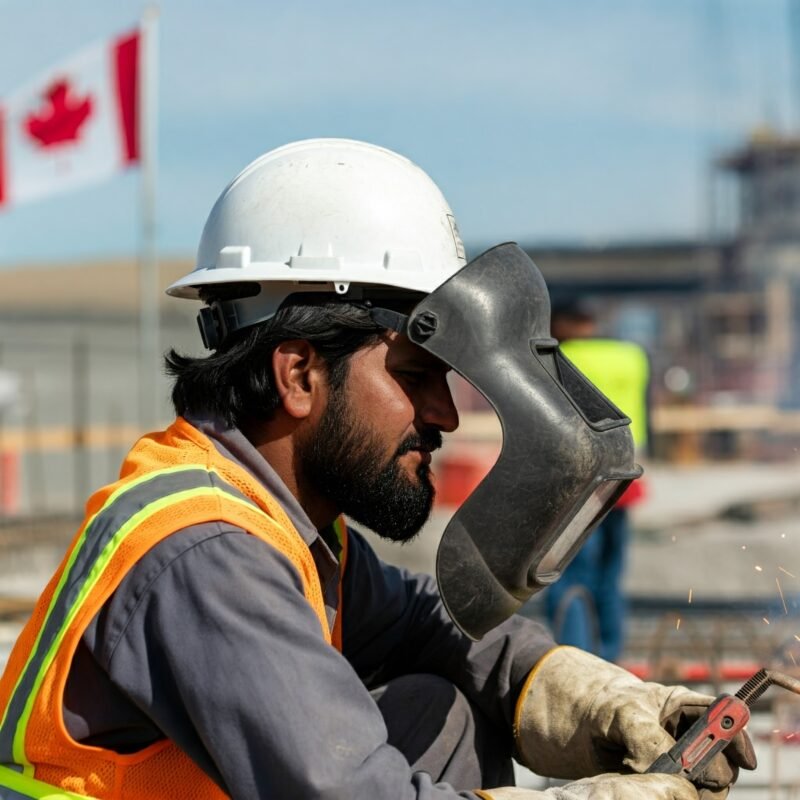
Introduction to Canadian Visas
Canada has emerged as a preferred destination for Pakistani nationals due to its high quality of life, world-renowned education system, and excellent career opportunities. The allure of Canada is multifaceted, offering vibrant multicultural cities, stunning natural landscapes, and a strong economy. These attributes make the country an attractive option for those seeking better prospects abroad.
Acquiring a Canada visa opens the door to numerous benefits. With a visitor visa, individuals can explore the expansive beauty of Canada, and partake in various cultural and leisure activities. A Canadian study permit allows students to gain access to some of the best educational institutions globally, vastly enhancing their knowledge and career trajectories. For those seeking employment, a work permit can lead to rewarding job opportunities in a robust market .That welcomes skilled professionals. Additionally, gaining permanent residency provides a pathway to eventually becoming a Canadian citizen. Enjoying full rights and benefits granted to permanent residents.
Diversity in visa types caters to the varied needs of Pakistani nationals. Visitor visas are ideal for short-term stays, enabling individuals to visit family, friends, or simply explore Canada’s rich cultural heritage. Study permits are specifically designed for students aiming to enroll in Canadian educational institutions. Work permits are the gateway for Pakistani nationals aiming to join Canada’s booming job market. Permanent residency, on the other hand, is the ultimate goal for many, granting the ability to live and work in Canada indefinitely.
overview
This guide intends to provide a comprehensive overview of the process to acquire different types of Canada visa from Pakistan, assisting aspirants in navigating the application procedure with ease. Each subsequent section will explain the specific requirements and procedures for visitor visas, study permits, work permits, and permanent residency, ensuring you are well-prepared to embark on your Canadian journey.
Visitor Visa
Obtaining a Canada visa (visitor) from Pakistan involves a systematic process, starting with meeting eligibility criteria. The fundamental requirements include possessing a valid passport, proving you have no criminal record, and demonstrating that you have strong ties to Pakistan such as employment, family, or property. Additionally, applicants must show adequate financial means to support their stay and the intention to return to Pakistan after their visit.

The application process can be initiated either online or through the Visa Application Centre (VAC). For online submissions, applicants need to create an account on the Immigration, Refugees, and Citizenship Canada (IRCC) website, fill out the necessary forms, upload supporting documents, and pay the processing fee. The list of documents typically required includes a passport-sized photograph, proof of financial support, a letter of invitation from a Canadian resident (if applicable), a detailed travel itinerary, and any previous visa refusals, if any.
Alternatively, applicants preferring to apply through the VAC must first complete the application form available on the IRCC website, gather the required documents, book an appointment with the nearest VAC, and then submit their application along with biometric information. It’s essential to book an appointment for biometric data collection as part of the application process.
The visitor visa processing times can vary, typically ranging from a few weeks to a couple of months, depending on the volume of applications and the time of year. Applicants are advised to apply well in advance of their planned travel dates. As for the fees, the standard processing fee for a visitor visa is CAD 100 per applicant. Additional charges may apply for biometric services.
Applicants can check the status of their application online through their IRCC account. Useful links that provide additional information and online forms include the official [IRCC website](https://www.canada.ca/en/immigration-refugees-citizenship.html) and the [VAC locator tool](https://visa.vfsglobal.com/vac-locator).
Study Permit

To acquire a study permit for Canada from Pakistan, it is imperative to follow a systematic process and meet specific criteria. Initially, the prospective student must secure an acceptance letter from a Designated Learning Institution (DLI) in Canada. This letter serves as a formal invitation to apply for a study permit and confirms that the student has been admitted to a recognized educational establishment.
Proof of financial support is another critical requirement. The applicant needs to demonstrate that they possess adequate funds to cover tuition fees, living expenses, and return transportation costs. Financial proof can be presented through bank statements, scholarship awards, or affidavits of support from sponsors.
Additionally, English language proficiency is mandatory for students from Pakistan aspiring to study in Canada. The International English Language Testing System (IELTS) is one of the most commonly accepted tests. Applicants must achieve a specific band score, which varies depending on the educational institution’s requirements.
The actual visa application process begins with creating an online account on the Government of Canada’s official immigration website. Applicants should accurately complete the application form, ensuring all provided information corresponds with their supporting documents. Once the form is filled out, the next step involves paying the application fee and scheduling an appointment to submit biometric information – fingerprints and a photograph.
It is also possible that a visa interview may be required. If this is the case, preparing thoroughly for the interview is crucial. Candidates should be ready to discuss their study intentions, the selected educational program, and future plans after completing their studies in Canada.
Lastly, submitting all required documents on time is essential. Missteps in this process can lead to delays or rejection. For further assistance, applicants can consult comprehensive guidelines and application forms available on the Government of Canada’s official website: [IRCC Website](https://www.canada.ca/en/immigration-refugees-citizenship.html).
Work Permit

Securing a work permit is a crucial step for anyone planning to work in Canada. There are primarily two types of work permits: employer-specific and open work permits. An employer-specific work permit allows individuals to work according to the conditions stipulated in their permit: the name of the employer, the job title, and the geographic location. In contrast, an open work permit is more flexible and does not require a confirmed job offer or Labour Market Impact Assessment (LMIA). It lets workers move between employers freely within Canada.
Eligibility criteria
for a Canada work permit can vary. Generally, applicants must prove they will leave Canada once their work permit expires and demonstrate they have enough money to take care of themselves and their family members during their stay and to return home. They must also show that they have no record of criminal activity and aren’t a danger to Canada’s security. An additional requirement is the submission of a medical exam, particularly for those from countries with higher health risks.
The documentation needed includes a valid passport, photographs, job offer letters, proof of financial stability, and completed application forms. Employer-specific permits require a valid job offer and, in many cases, an LMIA, which assesses the impact of hiring a foreign worker on the Canadian labor market. Employers need to obtain a positive LMIA to support the employment offer.
The steps
to apply for a work permit involve filling out the appropriate forms, collecting the necessary documents, paying the application fees, and submitting everything to the Immigration, Refugees, and Citizenship Canada (IRCC) either online or through a Visa Application Centre (VAC). Processing times for work permit applications can vary depending on the applicant’s country of residence and the workload of the specific visa office handling the application. It is advisable to check the most up-to-date processing times on the IRCC website.
To improve the chances of securing a work permit, it is essential to ensure all paperwork is complete and accurate. Seeking assistance from immigration consultants who are well-versed in Canadian immigration laws can also be beneficial. Staying informed about changes in work permit regulations and processing practices will further help applicants navigate the complexities of the application process.
Express Entry for Permanent Residency

The Express Entry system is a dynamic and efficient pathway for Pakistani nationals to secure Permanent Residency (PR) in Canada. It operates as a points-based system that manages applications for three federal economic immigration programs: the Federal Skilled Worker Program, the Federal Skilled Trades Program, and the Canadian Experience Class. Central to the Express Entry system is the Comprehensive Ranking System (CRS), which evaluates candidates based on factors such as age, education, work experience, and proficiency in English or French.
To initiate the process
eligible candidates must first create an Express Entry profile online, providing detailed information on their skills and background. This profile is then assessed, and a CRS score is allocated. Candidates with higher scores have a greater likelihood of receiving an Invitation to Apply (ITA) for PR. It is crucial for applicants to ensure their profiles are meticulously completed, as inaccuracies can lead to disqualification.
Eligibility criteria
for the Express Entry system include meeting the specific requirements of one of the three federal programs. Generally, this involves possessing a relevant mix of skilled work experience, language proficiency, and educational qualifications. Applicants also need to undergo an Educational Credential Assessment (ECA) and submit language test results from approved agencies like IELTS or CELPIP.
Applicants must submit a full application for PR within 60 days of receiving an ITA. They need to provide supporting documents, such as proof of work experience, education credentials, language test results, police clearance certificates, and medical examination results. The application fee for the principal applicant is CAD 1,325, with additional fees for accompanying family members and biometrics.
The processing time for Express Entry applications typically ranges between six to eight months. However, timelines can vary based on individual circumstances and the volume of applications received. For detailed guidance on the process and to start your application, candidates are advised to visit the Government of Canada’s official immigration website.
For further information and form submissions, visit:Express Entry page on the Government of Canada’s official website.
Provincial Nominee Program (PNP)
The Provincial Nominee Program (PNP) offers Pakistani applicants an alternative route to Canadian permanent residency. Unlike the Express Entry system, which is managed at a federal level, the PNP allows individual provinces and territories to nominate individuals based on their own specific regional labor market needs.
Some of the most popular provinces participating in the Provincial Nominee Program include Ontario, British Columbia, and Alberta. Each province has its own set of streams and criteria that cater to different groups of individuals such as skilled workers, entrepreneurs, and graduates. For instance, Ontario’s Human Capital Priorities Stream targets skilled workers, while British Columbia’s Tech Pilot focuses on tech professionals.
Eligibility requirements for the PNP vary by province and stream, but generally include criteria such as work experience in an occupation in demand, an employment offer from a Canadian employer, language proficiency, and sometimes a connection to the province through previous education or work. It is essential to review the specific requirements before applying to ensure compliance.
The application process typically involves two stages. Firstly, you need to apply to the province or territory for a nomination. Once you receive a nomination, you then apply to the federal government for permanent residency. To improve your chances of securing a provincial nomination, you should focus on several key aspects. These include ensuring your occupation aligns with a province’s demand list, gaining relevant work experience, and achieving high language test scores. It may also be beneficial to stay informed about provincial draws and to regularly check if new streams have been announced or criteria have been updated.
For more detailed information and resources, it is advisable to visit the official websites of the provincial immigration departments. Additionally, consulting with a licensed immigration consultant can provide tailored guidance suited to your unique circumstances.
Citizenship Pathways

Achieving Canadian citizenship is a significant milestone for many permanent residents. Once you have obtained permanent residency in Canada, you may be eligible to apply for citizenship, provided you meet certain criteria.
First, let’s discuss the eligibility criteria. To apply for Canadian citizenship, you need to have lived in Canada for at least 1,095 days (equivalent to three years) out of the last five years. Additionally, you must have filed taxes for at least three years within the qualifying period if required by law.
Language proficiency
is another key requirement. Applicants aged 18 to 54 must demonstrate adequate knowledge of English or French through various government-approved language tests, such as IELTS or CELPIP for English, and TEF for French.
Furthermore, you need to have sufficient knowledge of Canada. This involves understanding Canadian history, values, institutions, and symbols. Typically, a citizenship test assesses this through questions about these topics.
The application process involves several steps. Initially, you need to gather necessary documentation, including proof of permanent residence, language proficiency results, tax filings, and personal identification documents. Then, fill out the citizenship application form, available on the Government of Canada’s official website. The application fee is CAD 630 for adults and CAD 100 for minors under 18.
After submitting your application, processing times can vary, but typically it takes about 12 months .During this period, officials might call you for an interview and require you to attend a citizenship ceremony, where you will take the Oath of Citizenship.
Preparing for the citizenship test involves studying the official study guide: Discover Canada. Many applicants find practice tests helpful. Various resources, including practice quizzes and study groups, are accessible online to aid your preparation.
In conclusion
the journey to becoming a Canadian citizen involves meeting residency and language requirements, demonstrating knowledge of Canada, and successfully navigating the application process. Adequate preparation and utilization of available resources can greatly assist in achieving this cherished goal.
Tips and Resources
Embarking on the journey to acquire a Canada visa from Pakistan can be daunting, but with the right guidance and resources, the process can become significantly smoother. Here are some practical tips to help you navigate the complexities of the visa and immigration procedures.
First and foremost, it is imperative to ensure that all your application documents are complete and accurate. Double-checking your forms for errors or omissions can prevent unnecessary delays. Be meticulous about the details, especially when filling out personal information, employment history, and financial documentation.
Another crucial tip is to stay updated on the latest visa requirements and application guidelines. The official website of the Government of Canada (IRCC) offers detailed information on different visa categories, eligibility criteria, and application processes. Likewise, referring to the High Commission of Canada to Pakistan’s website can provide localized insights and updates specific to Pakistani applicants.
Utilizing online forums and communities such as Canada Visa or Reddit’s Immigration Canada can be valuable for sharing experiences and obtaining peer advice. These platforms often highlight common pitfalls to avoid and offer tips from individuals who have recently gone through the visa application process.
For direct and reliable assistance, consider using authorized immigration consultants and legal advisors. The Immigration Consultants of Canada Regulatory Council (ICCRC) and the Federation of Law Societies of Canada (FLSC) provide directories of certified professionals who can help streamline your application while ensuring adherence to legal norms.
Lastly, online resources such as CanadaVisa and Just for Canada offer extensive guides, application checklists, and updates on immigration policies. Leveraging these tools can make a significant difference in preparing a strong and timely visa application.
